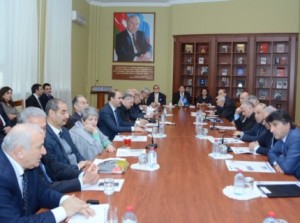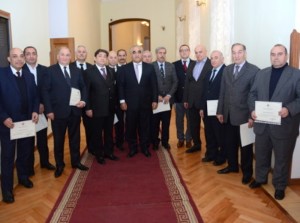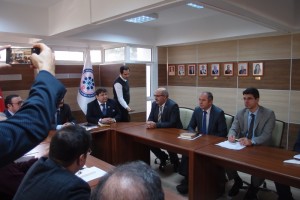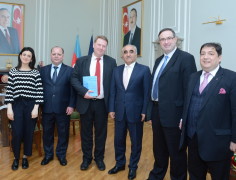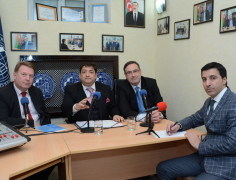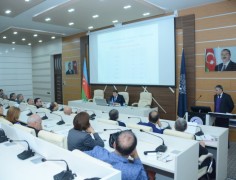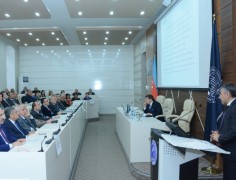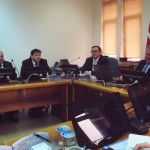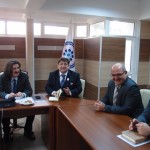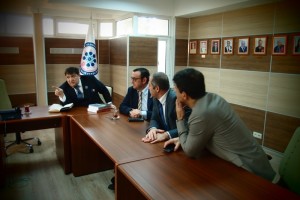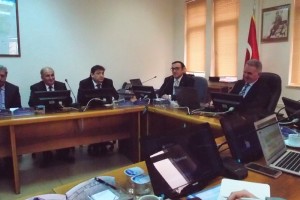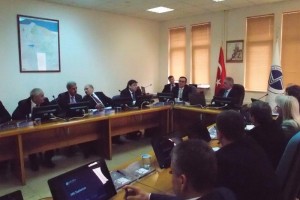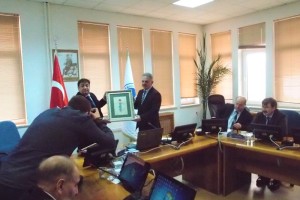CENTRE FOR SCIENCE AND INNOVATION
Director of the Department: Dr. of Econ. Prof. Zahid Farrukh MammadovContact: +(994) 12 492-72-98 |
The next report in the “Science Month”: “Tax policy and economic development” (24.10.2017)
Aziz Aliyev-120: “I Republic-wide Scientific-practical Conference” (12.05.2017)
Results of the “Science Month” discussed on Radio UNEC (30.11.2016)
A Conference held at UNEC: “Development of Independent Azerbaijan in Figures (24.11.2016)
Winners of the Competition of Scientific Articles are awarded (22.11.2016)
“Science Month” was completed at UNEC (10.11.2016)
The Nobel Lectures held within the “Science Month” completed at UNEC (08.11.2016)
The Nobel Lectures are going on within the “Science Month” at UNEC (03.11.2016)
Reports about the Nobel Prize Laureates: Paul Krugman (28.10.2016)
The “Science Month” serves to convert UNEC into a Scientific- research Oriented University (20.10.2016)
25 Years of Independence: The Results of Socio- economic Development and Perspectives (18.10.2016)
Novelty at UNEC: “Science Month” (17.10.2016)
Foreign Visitors speak about the importance of the International Conference (29.09.2016)
Foreign Visitors speak about the importance of the International Conference (29.09.2016)
UNEC Economists and Chinese Researcher discuss the current situation of the World Economy (18.12.2015)
About the Centre for Science and Innovation
The Centre was established with the Decision #131 of the meeting of the Scientific Council of the Azerbaijan State Economic University dated September 19, 2014.
Centre is the structural unit of the University organizing and coordinating issues related to the science and innovations. The Centre is consisted of following structural units:
– Scientific-Research Institute of Economic Studies (SRIES);
– Science section;
– Doctorate studies section;
Main operation directions of the Centre
The Centre, according to its Statute and Statutes of subordinated structural units, organizes:
* implementation of studies on economy, social development, regional and infrastructure, information economy, forecasting, innovation and other directions;
* application of results of scientific-research activities in the production and training process (lecture, seminar, courses, laboratory classes, case studies, final graduation works, master degree dissertations), publication in the form of monographs, scientific articles, textbooks, training aids, methodical aids, reporting and promotion at scientific forums;
* direction of scientific studies of innovation character towards improvement of organization and management of the education, arrangement of the training process based on modern methods, development of new educational technologies and pedagogical innovation on other fields;
* organization and coordination of scientific-research and scientific-education works of staff of the University;
* organization and implementation of activities aimed at the preparation of high qualified scientific-pedagogical specialists.
Objectives and duties of the Centre
Main objective of the Centre is to organize and coordinate activities in determined areas.
On SRIES:
actual problems of the national economy, including sustainable development, macroeconomic regulation, acceleration of social and regional development, development tendencies of the global economy and assessment of geopolitical relations and position of Azerbaijan, organization of sociological research, expert, consulting and audit services, forecasting of local and global economic development, preparation of social-economic development concept, program and rating tables.
On the Science section:
to implement general scientific development programs of the University, to improve fundamental, applied research and technical inventions of professors and teachers and to upgrade scientific-research activities of departments.
On the Doctorate degree section: to preserve and develop scientific-technical capacity of the University, to train high qualified scientific-pedagogical staff.
*
Main duty of the Centre is to carry out operations on determined directions.
On SRIES:
To ensure implementation of studies on world economy and national economy, social development, regional and infrastructure, information economy, forecasting, innovation and other directions.
On the Science section:
To ensure organisation and coordination of scientific-research and scientific-educational works of pedagogical staff of the university
On the Doctorate degree section:
To organize and implement activities on training of high qualified scientific-pedagogical staff.
Science, education and innovation triangular
What obligations does impose on the University?
Followings are considered new obligations imposed by the science, education and innovation triangular
* Prepare new education standards on current and new specialities related to higher economic education for renewing the content of the economic education. Update curriculum on specialities and directions taught at the University;
* Develop human resources in the broad economic education field, as a strategic goal, through their modernization, strengthen the innovation capacity of the University based on the synthesis of human, social and intellectual capital of training providers;
* Establish the organizational framework of lifelong education on the basis of the University (including virtual education, media and distant education models);
* Strengthen material-technical framework of the University for ensuring fulfilment of strategic goals, establish summer schools, campus and other training tools;
* Establish economic and socially viable financing system of the science-education-innovation-complex in line with standards of leading education facilities of the world (main business plan).
* Improve the teacher remuneration system in relation with drafting University curriculum, updating textbooks;
* Increase the competition advantage in the field of higher economic education in the region through the knowledge triangular of the University;
* Improve and increase practical importance of research works conducted by departments of the University;
* Establish scientific-oriented laboratories at departments of the University;
* Increase science-intensity of education;
* Expand activities on technological transfers, organize exchange of innovations and encourage innovation activities.
